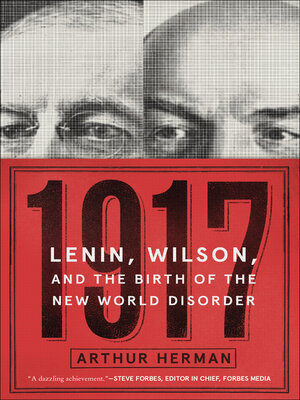
Sign up to save your library
With an OverDrive account, you can save your favorite libraries for at-a-glance information about availability. Find out more about OverDrive accounts.
Find this title in Libby, the library reading app by OverDrive.



Search for a digital library with this title
Title found at these libraries:
| Library Name | Distance |
|---|---|
| Loading... |
In this dual biography, New York Times bestselling author Arthur Herman brilliantly reveals how Lenin and Wilson rewrote the rules of modern geopolitics.
In April 1917, Woodrow Wilson—champion of American democracy but also of segregation, advocate for free trade and a new world order based on freedom and justice—thrust the United States into the First World War in order to make the “world safe for democracy”—only to see his dreams for a liberal international system dissolve into chaos, bloodshed, and betrayal.
That October, Vladimir Lenin—communist revolutionary and advocate for class war and “dictatorship of the proletariat”—would overthrow Russia’s earlier democratic revolution that had toppled the powerful czar, all in the name of liberating humanity—and instead would set up the most repressive totalitarian regime in history, the Soviet Union.
Prior to and through the end of World War I, countries marched into war only to advance or protect their national interests. After World War I, countries began going to war over ideas. Together Lenin and Wilson unleashed the disruptive ideologies that would sweep the globe, from nationalism and globalism to Communism and terrorism, and that continue to shape our world today.
Our new world disorder is the legacy left by Wilson and Lenin, and their visions of the perfectibility of man. More than a century later, we still sit on the powder keg they first set the detonator to, through war and revolution.
“Deeply researched and engagingly written, this is a gripping account of great battles won and lost, of a triumphant war followed by a failed peace, and of clashing ideologies that shaped a century.” —Robert Kagan
In April 1917, Woodrow Wilson—champion of American democracy but also of segregation, advocate for free trade and a new world order based on freedom and justice—thrust the United States into the First World War in order to make the “world safe for democracy”—only to see his dreams for a liberal international system dissolve into chaos, bloodshed, and betrayal.
That October, Vladimir Lenin—communist revolutionary and advocate for class war and “dictatorship of the proletariat”—would overthrow Russia’s earlier democratic revolution that had toppled the powerful czar, all in the name of liberating humanity—and instead would set up the most repressive totalitarian regime in history, the Soviet Union.
Prior to and through the end of World War I, countries marched into war only to advance or protect their national interests. After World War I, countries began going to war over ideas. Together Lenin and Wilson unleashed the disruptive ideologies that would sweep the globe, from nationalism and globalism to Communism and terrorism, and that continue to shape our world today.
Our new world disorder is the legacy left by Wilson and Lenin, and their visions of the perfectibility of man. More than a century later, we still sit on the powder keg they first set the detonator to, through war and revolution.
“Deeply researched and engagingly written, this is a gripping account of great battles won and lost, of a triumphant war followed by a failed peace, and of clashing ideologies that shaped a century.” —Robert Kagan







